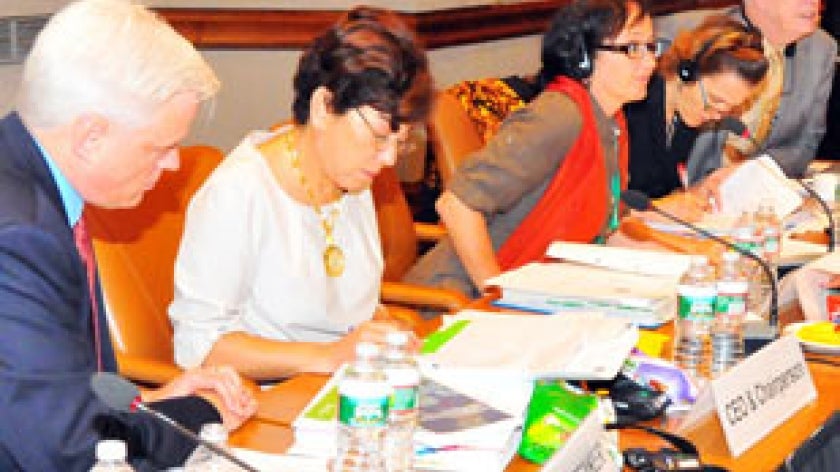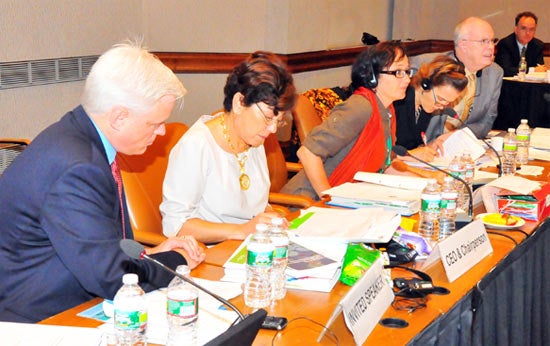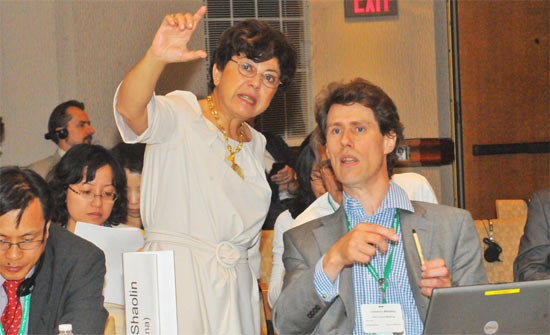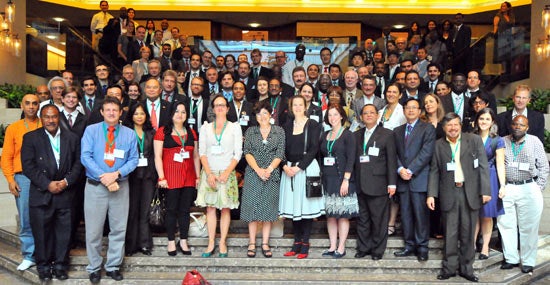
MAY 24
The 40th meeting of the Global Environment Facility (GEF) Council was opened by Monique Barbut, CEO/Chairperson of the Facility, who underscored that the Council’s decisions on Article 28 of the GEF instrument (cooperation with other bodies) will influence further international environmental financial decisions, notably those at the Durban Climate Change Conference and the UN Conference on Sustainable Development (UNCSD, or Rio+20). She noted the key innovation of allowing regional and national entities and non-governmental organizations to become partner entities with the GEF.
The Council then elected by acclamation Karine Siegwart (Switzerland) as Co-Chair, adopted the agenda for its three-day meeting, and worked through its first full day of deliberations. James Willis, Joint Executive Secretary of the Basel, Stockholm and Rotterdam Conventions, reported on the fifth meeting of the Conference of the Parties (COP) to the Stockholm Convention along with upcoming COP meetings of the Basel and Rotterdam Conventions.
Yolando Velasco, UN Framework Convention on Climate Change (UNFCCC) Secretariat, on behalf of Christiana Figueres, UNFCCC Executive Secretary, said aligning the GEF climate change focal area, the LDC (Least Developed Countries) Fund and Special Climate Change Fund to the priorities that are emerging in the negotiations will be crucial for implementing the Cancun Agreements. He also thanked the GEF for contributing to the Transitional Committee of the Green Climate Fund by seconding a senior staff member to the Technical Support Unit. Following these statements, the GEF Council discussed relations with the conventions and strengthening relations with the conventions in the GEF Network.
Thomas Lovejoy, Chair of the Scientific and Technical Advisory Panel (STAP), presented recent STAP initiatives and advisory products, including work on: Persistent Organic Pollutants (POPs) disposal technology; hypoxia in coastal marine ecosystems; marine debris; and a review of current adaptation strategies among development agencies. He said STAP is engaged in the “Planet Under Pressure” scientific conference, which will take place in March 2012 as an input to Rio+20.
During the afternoon, the GEF Council considered agenda items on: the Annual Country Portfolio Evaluation Report-2011 and Management Response; the Annual Performance Report-2010 and Management Response; the Annual Monitoring Report; the Four-Year Work Program and Budget of the Evaluation Office; and, in an Executive Session, the FY12 -14 Business Plan and FY12 Corporate Budget.

L-R: Andrew Velthaus, GEF; Co-Chair Monique Barbut, GEF CEO; Co-Chair Karine Siegwart, Switzerland; Brennan Van Dyke, GEF; and Robert van den Berg, GEF
MAY 25
During the second day of the 40th meeting of the Global Environment Facility (GEF) Council, Council Members concluded their deliberations on: the Evaluation Office and Corporate FY12 budgets; the work programme; and enhancing the visibility of the GEF. The work programme comprises project concepts and one programmatic approach – regarding support for the Great Green Wall initiative – subject to comments made during the Council meeting and additional comments that may be submitted to the GEF Secretariat by 9 June 2011.
Following a discussion of the strategy to engage with the private sector, the Council agreed to call for comments and to ask the Secretariat to resubmit the strategy to the November 2011 Council meeting.
The Council discussed the proposal for broadening the GEF Partnership under Paragraph 28 of the GEF Instrument, which seeks to set the criteria and accreditation procedures for allowing new entities into the Partnership during a pilot phase, recommending that five of ten new agency spots be reserved for national institutions and not approving applications for other types of entities (regional, NGO) until those five slots are filled. Members disagreed on whether bilateral agencies should be included during the pilot phase, and will continue their discussion Thursday morning. Related to this agenda item, they also discussed a revised proposal for GEF policies on environmental and social safeguards and gender mainstreaming, and agreed to refer to the policies on environmental and social safeguards as “provisional,” with a view to revisiting them at the November 2011 Council meeting.
A new draft of the document on “Outstanding Issues Related to the Nagoya Protocol Implementation Fund” was circulated on Wednesday afternoon. Following an initial discussion, Council Members decided to continue their deliberations on Thursday.

L-R: Co-Chair Monique Barbut, GEF CEO, and Josceline Wheatley, United Kingdom
MAY 26
The 40th meeting of the Global Environment Facility (GEF) Council concluded its three-day meeting at 3:54 pm on Thursday, 26 May.
Following the adoption on Thursday, Council Members applauded their “historic” decision on broadening the GEF Partnership under Paragraph 28 of the GEF Instrument, which was reached after a drafting group developed language indicating that, while bilateral agencies will not be eligible for accreditation at this time, their participation in the pilot phase will be considered at the first meeting of the Council in 2013. Members also applauded their decision to approve the arrangements for the operation of the Nagoya Protocol Implementation Fund. At the conclusion of the discussion on this topic, the representative from France announced that her country would contribute 1 million Euros to the Fund.
Among other items, the Council also discussed a proposal for criteria for the establishment of trust funds within the GEF, but asked the Secretariat to revise the proposal for consideration by Council at its November 2011 meeting, taking into account views expressed by Council members at this meeting. The Council also discussed an upcoming review of GEF Agency fees, and information regarding the status of the Instruments of Commitment and the possible implications for GEF-5 programming in the potential case of decisions of donor countries to defer contributions following arrears of individual donor countries.
During the 10th meeting of the Council for the Least Developed Countries Fund (LDCF) and Special Climate Change Fund (SCCF), which took place in the afternoon, Germany pledged 50 million Euros to the LDCF, and 25 million to the SCCF, and Australia pledged AUS$ 15 million to the LDCF, as Copenhagen Climate Change Conference fast start financing pledges.

Click to enlarge